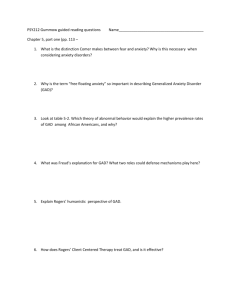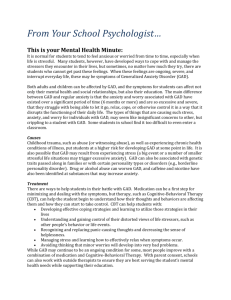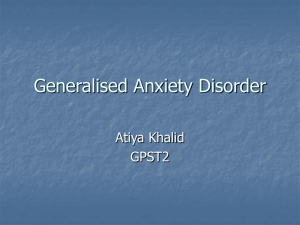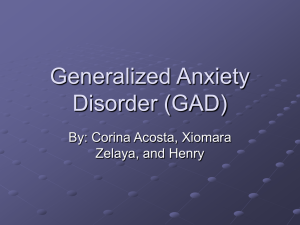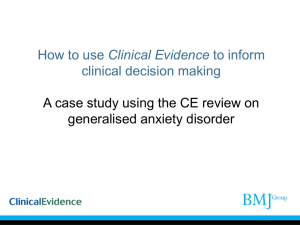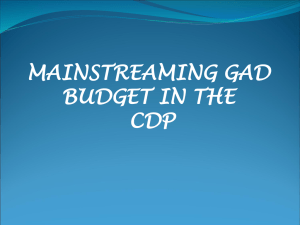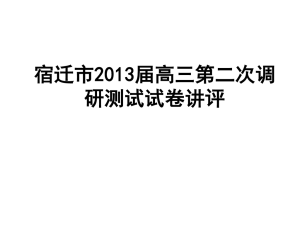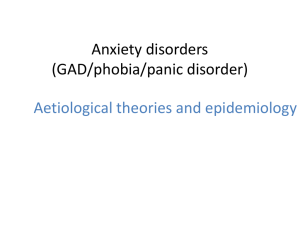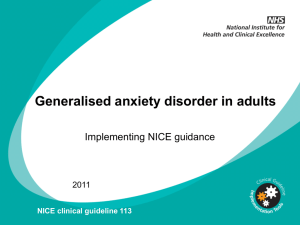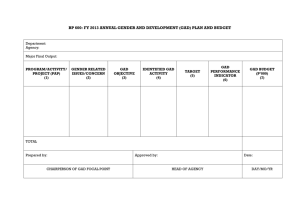Generalized Anxiety Disorder
advertisement
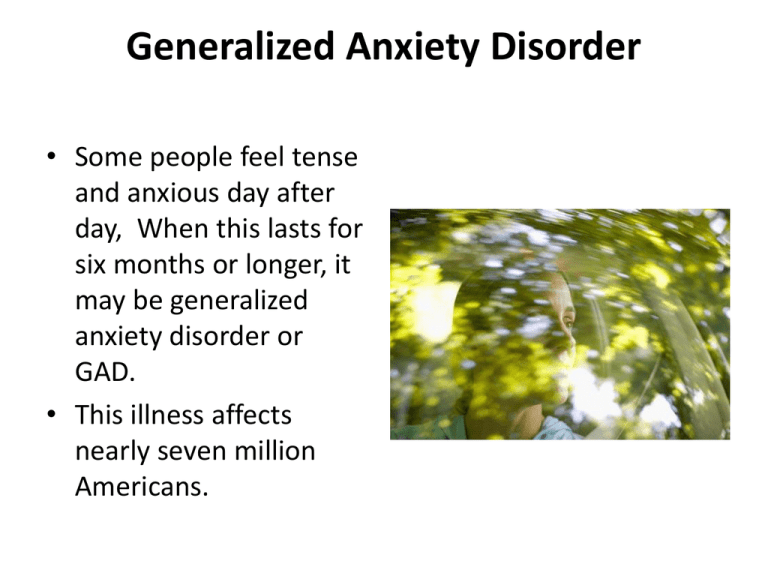
Generalized Anxiety Disorder • Some people feel tense and anxious day after day, When this lasts for six months or longer, it may be generalized anxiety disorder or GAD. • This illness affects nearly seven million Americans. GAD: Emotional Symptoms • A constant and exaggerated sense of tension and anxiety. • Worrying can interfere with your sleep and your ability to think straight. • Irritable. GAD: Physical Symptoms • Body problems usually come along with the excess worry. They can include: • Muscle tension or pain • Headaches • Nausea or diarrhea • Trembling or twitching Do You Have Everyday Worries? • Worrying about troubles, money, job demands, or changing relationships. • Hardly stop worrying. • Impossible to relax. • In severe cases, GAD can interfere with work, relationships, and daily activities. Who Gets GAD? • People of any age can develop GAD, even children. • The disorder tends to appear gradually, with the first symptoms most likely to occur between childhood and middle age. • GAD affects twice as many women as men. What Causes GAD? • The genes passed down through a family may put some people at a higher risk for anxiety. • Scientists think that a mix of DNA, environment, and psychological factors are to blame. • Researchers are looking at brain chemicals called neurotransmitters, as well as a pair of structures inside the brain called the amygdalae Diagnosing GAD • Diagnosis is made based on your description of about your anxiety. • What do you worry about? How often? Does your anxiety interfere with any activities? You may have GAD if you have been feeling anxious or worrying too much for at least six months. Social Anxiety Disorder • People with social phobia feel overly panicky and self-conscious in ordinary social situations. • Symptoms include a sense of dread before social events and sweating, blushing, nausea, or difficulty talking during the events. • In severe cases, people with social phobia may avoid school or work. • The disorder affects 15 million American adults and can be treated with Dr. Zhao TCM. Obsessive-Compulsive Disorder • Common compulsions include excessive hand-washing and locking the door repeatedly. • They may get dressed in a certain order or count objects for no good reason. • Many people with OCD know their rituals don't make sense but can't stop doing them. • OCD affects about two million Americans. Panic Disorder People with panic disorder have sudden attacks of terror. Symptoms can include a pounding heart, sweating, dizziness, nausea, or chest pain. You may think you're having a heart attack, dying, or losing your mind. Panic disorder affects about six million American adults, and it's one of the most treatable of all anxiety disorders. GAD and Other Disorders • People who have GAD may also develop depression, alcoholism, or drug addiction. If one of these illnesses occurs, Dr. Zhao TCM is very helpful. • Dr. Zhao TCM can prevent you from panic disorder, posttraumatic stress disorder, obsessivecompulsive disorder, and social phobia. Other Phobias • A phobia is an intense fear of something that is not likely to cause you any harm. • Common phobias include heights, closed-in spaces like elevators or tunnels, dogs, flying, and water. • About 19 million Americans have specific phobias. • The phobias respond very well to Dr. Zhao TCM therapy. Dr. Zhao TCM Help for Anxiety • Start by discussing your anxiety with Dr. Zhao. • To take Yin-Yang and Tension Free capsules for 3-6 months. • To get acupuncture twice per week. • You will feel better in 23 weeks. Herbal Remedies for GAD • Among herbal remedies, there is some evidence that Rishi, Ophiocordyceps and Pueraria help ease mild to moderate anxiety. • Yin-Yang Balance help your hormone, immune and nerve system. Treating GAD: Tension Free • The therapy is very effective in treating anxiety. • Tension Free help your calm and relax your muscles. • Tension Free helps you reduce your negative thoughts and actions. • Tension Free help your hormone and energy. • You will feel better in three to four weeks. Complementary Remedies for GAD • Acupuncture can help stress. • Acupuncture can help insomnia. • Acupuncture can help fatigue. • Acupuncture can reduce worries and calm nerve system. Self-Care for GAD Support the treatment for GAD by making a few simple changes in habits. Avoid caffeine, street drugs, and even some cold medicines, which can boost anxiety symptoms. Try to get enough rest and eat healthy foods. Try relaxation techniques, such as yoga or meditation. And be sure to exercise; there's evidence that moderate physical activity can have a calming effect. Treating GAD: Medicine • Some antidepressant drugs work well to lower anxiety. Brand names include Cymbalta, Effexor XR, Lexapro, and Paxil. • These drugs carry a risk of dependence.
